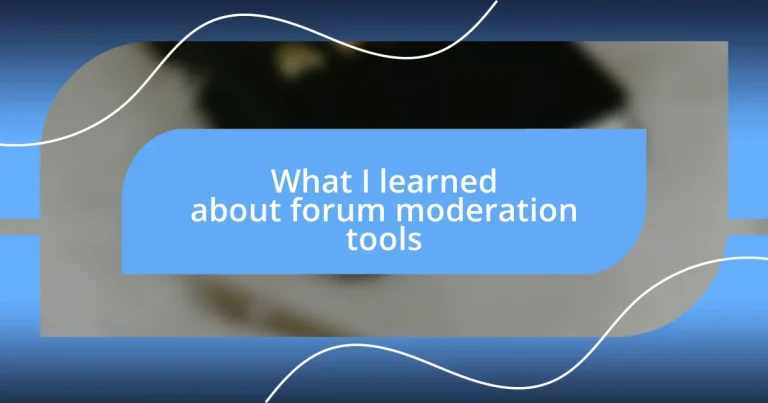Key takeaways:
- Effective forum moderation tools foster a safe environment and ensure quality discussions, enabling constructive conversations among members.
- Key features like automated alerts, user reporting systems, and customizable guidelines empower both moderators and users, enhancing community engagement.
- Challenges in moderation include managing user conflicts, spam, and sustaining community engagement, necessitating adaptability and creativity from moderators.
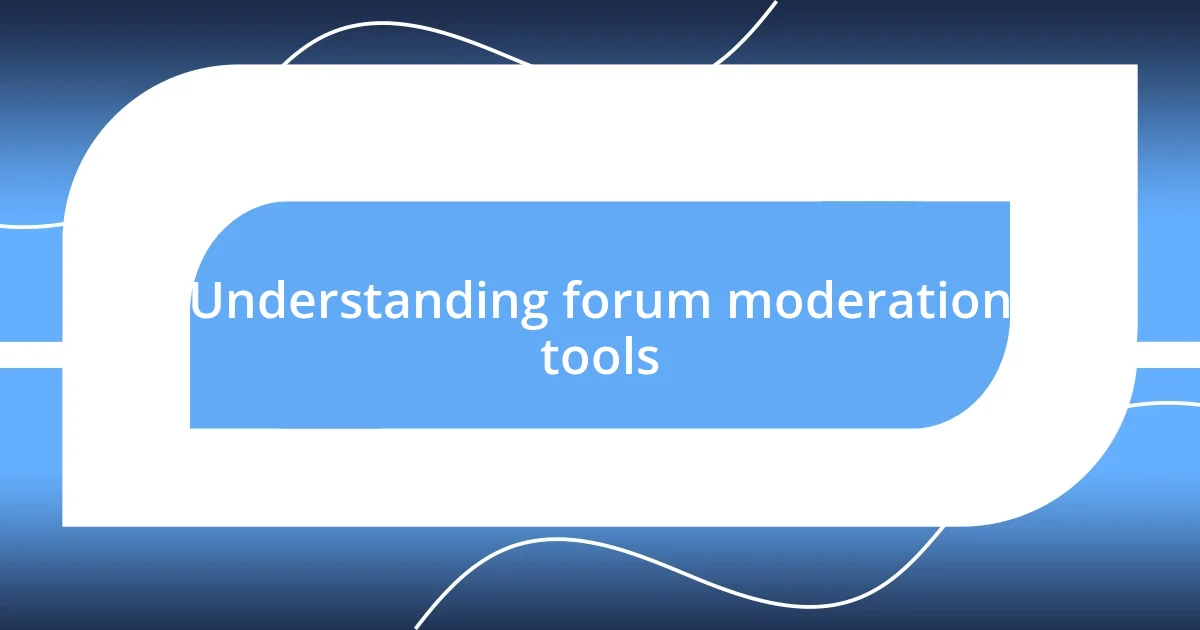
Understanding forum moderation tools
When diving into the world of forum moderation tools, I quickly realized how essential they are for maintaining a healthy online community. Imagine being the captain of a ship; without the right tools, navigating the choppy waters of user interactions can be daunting. Moderation tools not only help in managing discussions but also foster a sense of safety and respect among members.
During my early days as a moderator, I learned the hard way just how vital these tools could be. I remember a heated debate spiraling out of control—posts were being flagged, and tensions were running high. It was then that I recognized how features like automated moderation alerts and comment threading could steer a conversation back on track. Have you ever faced a situation where a single comment sparked chaos? With the right tools, it’s possible to regain control even in those moments of turmoil.
Understanding these tools goes beyond mere technical knowledge; it shapes the very culture of a forum. Every tool, whether it’s user reporting systems or posting guidelines, serves a purpose in cultivating a respectful dialogue. As I’ve seen firsthand, it’s not just about keeping the peace—it’s about creating an environment where every member feels valued and heard.
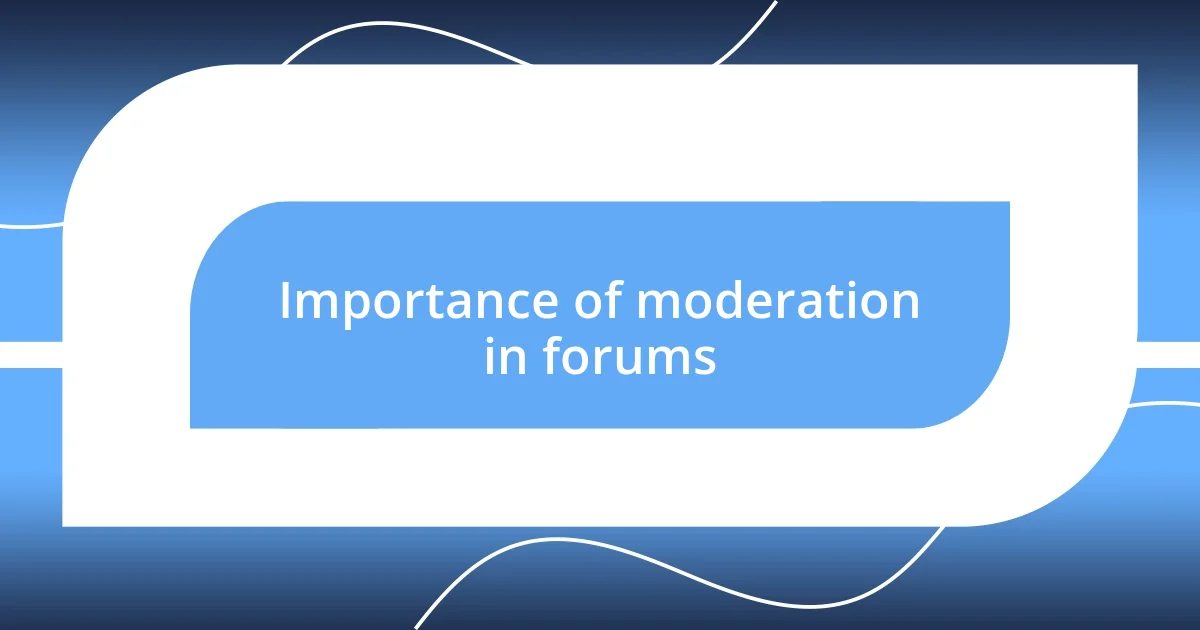
Importance of moderation in forums
Moderation in forums is crucial for enhancing user experience and ensuring constructive conversations. My experience has shown that a well-moderated forum can transform chaotic threads into valuable exchanges of ideas. Just the other day, I saw a community flourish when moderators actively engaged with members. The discussions became richer, and users felt more motivated to participate.
Consider these key points about the importance of moderation in forums:
- Safety: It creates a secure space where users can openly share thoughts without fear of harassment.
- Quality Control: Moderation helps maintain the quality of discussions, ensuring they remain informative and relevant.
- Conflict Resolution: It provides mechanisms for resolving disputes, allowing members to focus on collaboration rather than contention.
- Community Building: Active moderation fosters a sense of belonging and respect among users, encouraging loyalty to the forum.
I recall a specific instance when an argument escalated between two seasoned forum members. It was daunting watching them go back and forth. But with timely intervention and clarifying the rules, we were able to defuse the situation. Rather than banning anyone, I opted for a conversation, and it turned into a learning moment for the entire community. This experience underscored my belief in moderation not just as a reactive measure, but as a proactive way to uphold community standards and nurture positive interactions.
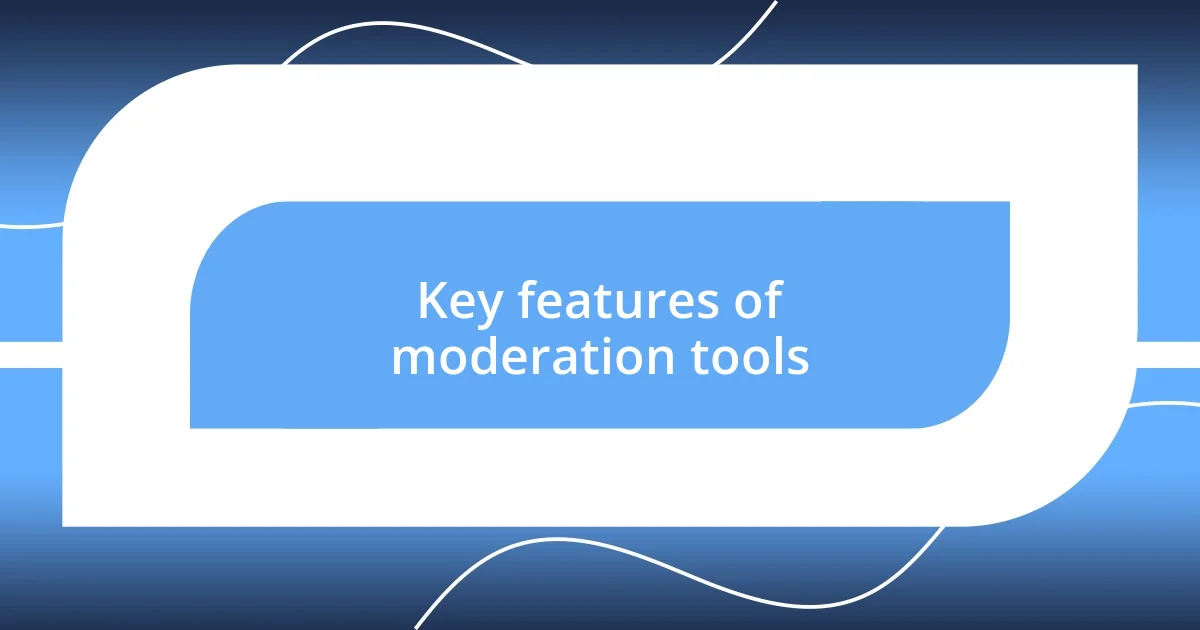
Key features of moderation tools
When evaluating moderation tools, I’ve come across several features that stand out in their ability to enhance community management. Automated moderation alerts can be a lifesaver, especially in busy forums. I remember a time when countless posts were flying in, and one inflammatory comment threatened to spark a full-scale argument. Luckily, with real-time alerts, I was able to step in promptly, saving the conversation from completely derailing.
Another key feature that I find invaluable is user reporting systems. This allows community members to signal problematic behavior, which is crucial for any healthy forum. Personally, I’ve had instances where users felt empowered to report issues, leading to faster resolutions and, ultimately, a stronger community. There’s something reassuring about knowing that the tool is in place to empower users and foster a cooperative atmosphere rather than relying solely on moderators.
Lastly, customizable posting guidelines are essential. They help set the tone for discussions from the very beginning. Whenever I’ve implemented clear, concise guidelines, it’s made a noticeable difference. I recall a situation where an influx of new members joined, and because we established clear guidelines early on, it created a welcoming environment that encouraged positive interactions. It’s fascinating how small adjustments like these can influence long-term engagement within the forum.
| Feature | Description |
|---|---|
| Automated Moderation Alerts | Real-time notifications for flagged content to ensure prompt responses. |
| User Reporting Systems | Empowering users to report inappropriate behavior for faster resolution. |
| Customizable Posting Guidelines | Setting clear expectations for behavior to establish a positive atmosphere. |
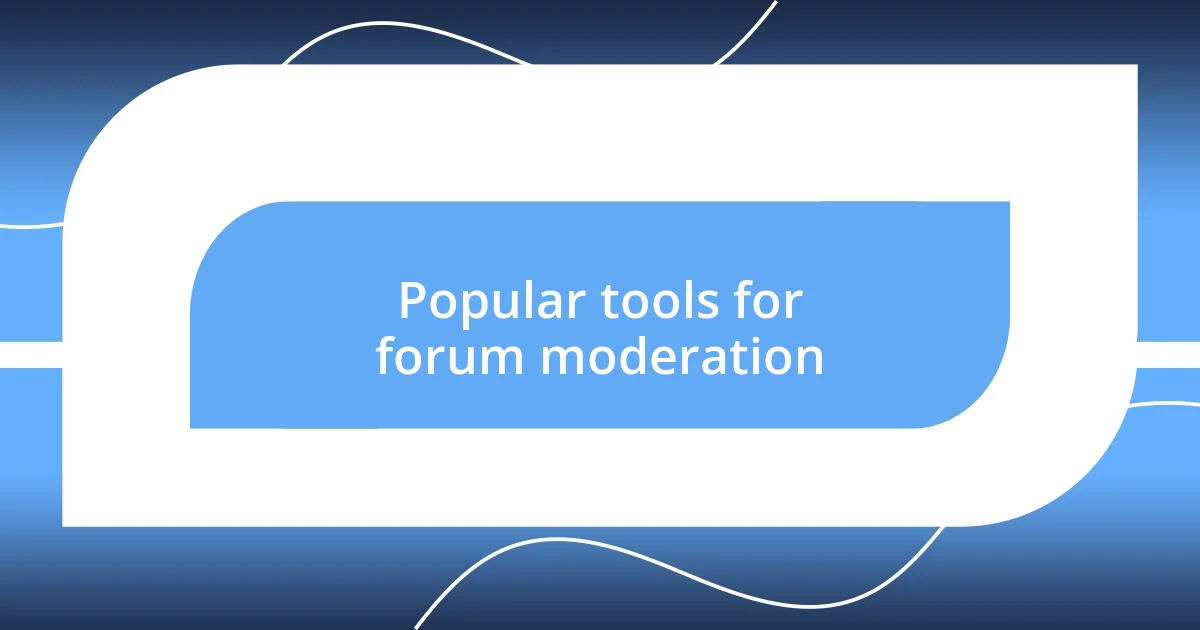
Popular tools for forum moderation
In my journey of exploring forum moderation tools, I’ve come across some popular options that genuinely elevate the experience. For instance, I have consistently found tools like Discourse invaluable. This platform not only supports real-time discussions but also has robust moderation features. I vividly recall a time when its integrated trust levels empowered users to gain privileges as they engaged positively. That dynamic turned members into community champions rather than simply audience members.
Another tool worth mentioning is Tapatalk, which excels at mobile accessibility. I once transitioned our forum to a mobile-friendly version using Tapatalk, and the shift was remarkable. Notifications and active moderation on the go helped keep conversations alive outside traditional desk hours, creating a buzz that was both exciting and rewarding. Have you ever witnessed how an upgrade can be a game changer? For me, it was like flipping a switch; our community became more involved and connected.
Lastly, Kialo caught my attention with its unique approach to structured debates. I stumbled upon it while seeking a way to reduce argumentative derailments. It didn’t just help with moderation; it fostered thoughtful discussions, with users feeling their voices mattered in a civil manner. I remember participating in a lively debate and recognizing how clarity in argumentation led to more respectful exchanges. Isn’t it refreshing to see constructive dialogue thrive in an online space? Those experiences taught me that the right tools can transform a forum, nurturing both collaboration and creativity among members.
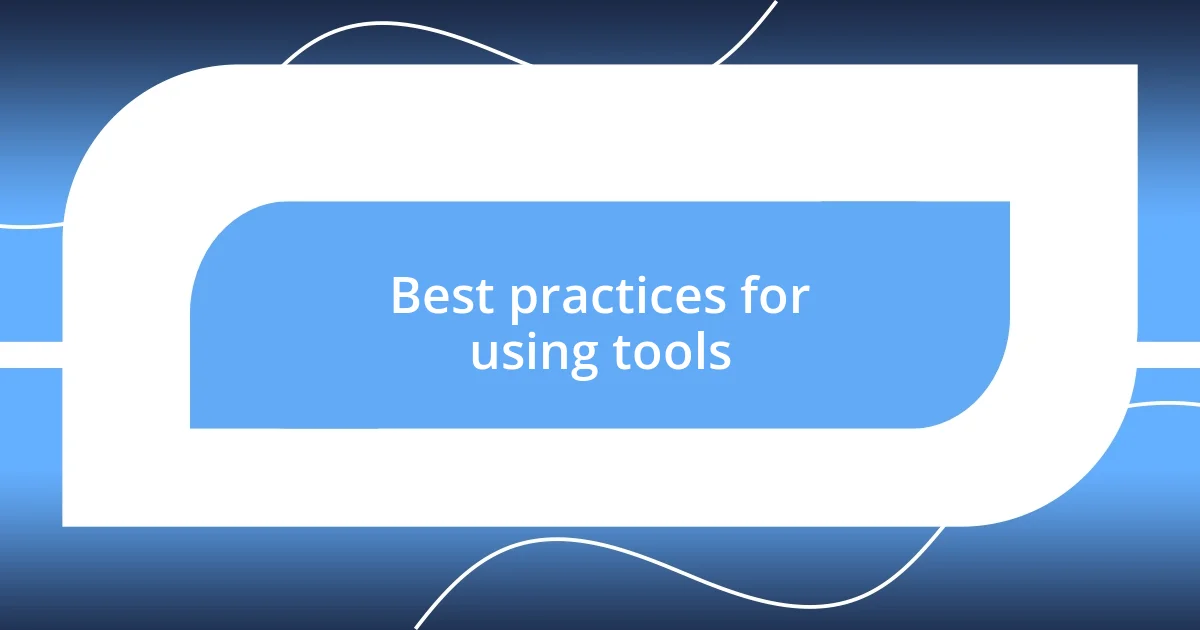
Best practices for using tools
When utilizing moderation tools, consistency is key. I’ve learned that following guidelines regularly helps establish trust within the community. I often reflect on the times I overlooked a post’s guidelines, thinking a one-off exception wouldn’t matter—oh, how wrong I was! Those moments taught me that maintaining uniformity creates a secure environment where everyone feels respected and heard.
Another best practice is to embrace feedback from community members regarding the moderation tools themselves. I remember introducing a new reporting feature and was surprised by the responses. Some users appreciated it immensely, while others shared that it felt cumbersome. Listening to their insights not only improved the tool but also made the users feel valued. Have you ever made adjustments based on feedback? It’s incredible what happens when you open the floor for dialogue—the community feels a little more involved, and trust deepens.
Lastly, don’t underestimate the power of training sessions. I vividly recall organizing a workshop on best practices for using our forum’s moderation tools. It was enlightening! I was amazed at how many issues we resolved simply by ensuring everyone understood the tools better. There’s a certain satisfaction in watching confusion turn into clarity, isn’t there? When everyone is equipped with knowledge, the whole community thrives, and as moderators, we can breathe a little easier.
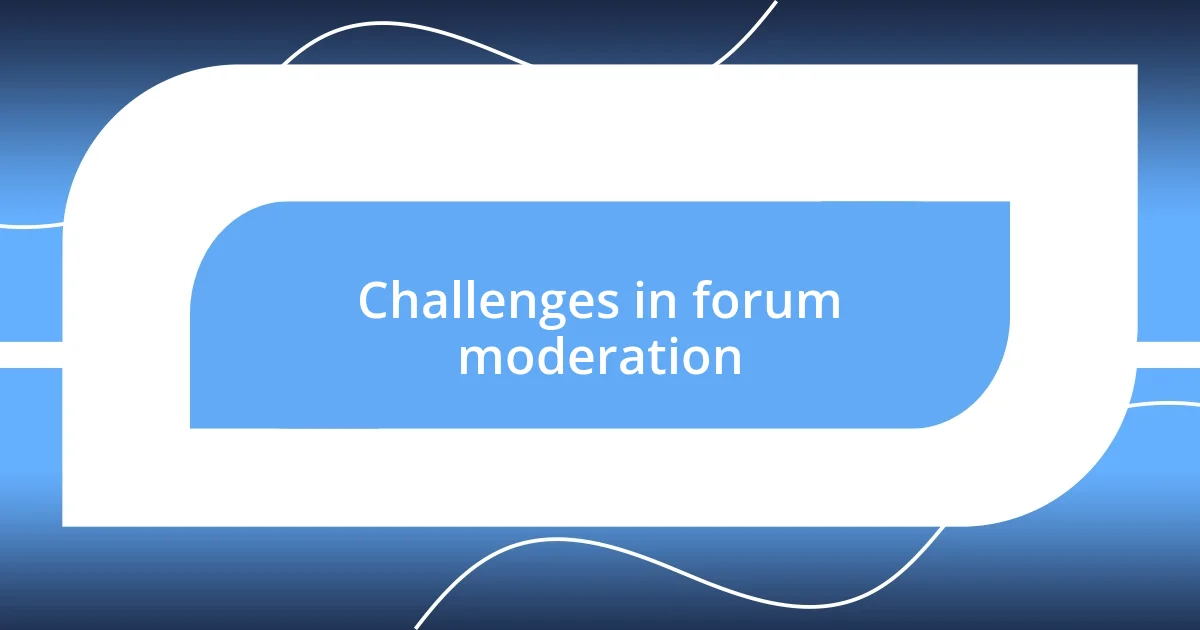
Challenges in forum moderation
Maintaining harmony in online forums can feel like walking a tightrope. One of the greatest challenges I’ve faced is tackling user conflicts, which can escalate quickly. I recall an instance where a fierce debate erupted over a topic that I thought was trivial. The moment I stepped in to moderate, I sensed the rising tensions. Personal stakes run high in discussions, and if not handled delicately, the community spirit can easily be dampened.
Another persistent hurdle is managing spam and harmful content. There was a period when I felt as if I were playing whack-a-mole, tirelessly removing inappropriate posts while new ones seemed to pop up in droves. Automating this process with moderation tools has proven beneficial, yet understanding the subtleties of context remains essential. Have you ever noticed how even the most innocent-sounding post can sometimes lead to unintentional negativity? This awareness shapes my approach daily, reminding me to review context rather than just content.
Perhaps the most profound challenge is keeping the community engaged and active. I’ve encountered lulls where interaction faded, leaving me questioning what went wrong. I’ll never forget when I organized a themed week to reignite conversations. The excitement was palpable, and contributions surged. Engaging the community requires constant creativity and mindfulness about what resonates. Have you felt that spark of inspiration when a fresh idea breathes life back into a space? It’s moments like these that remind me of the importance of adaptability in moderation.












